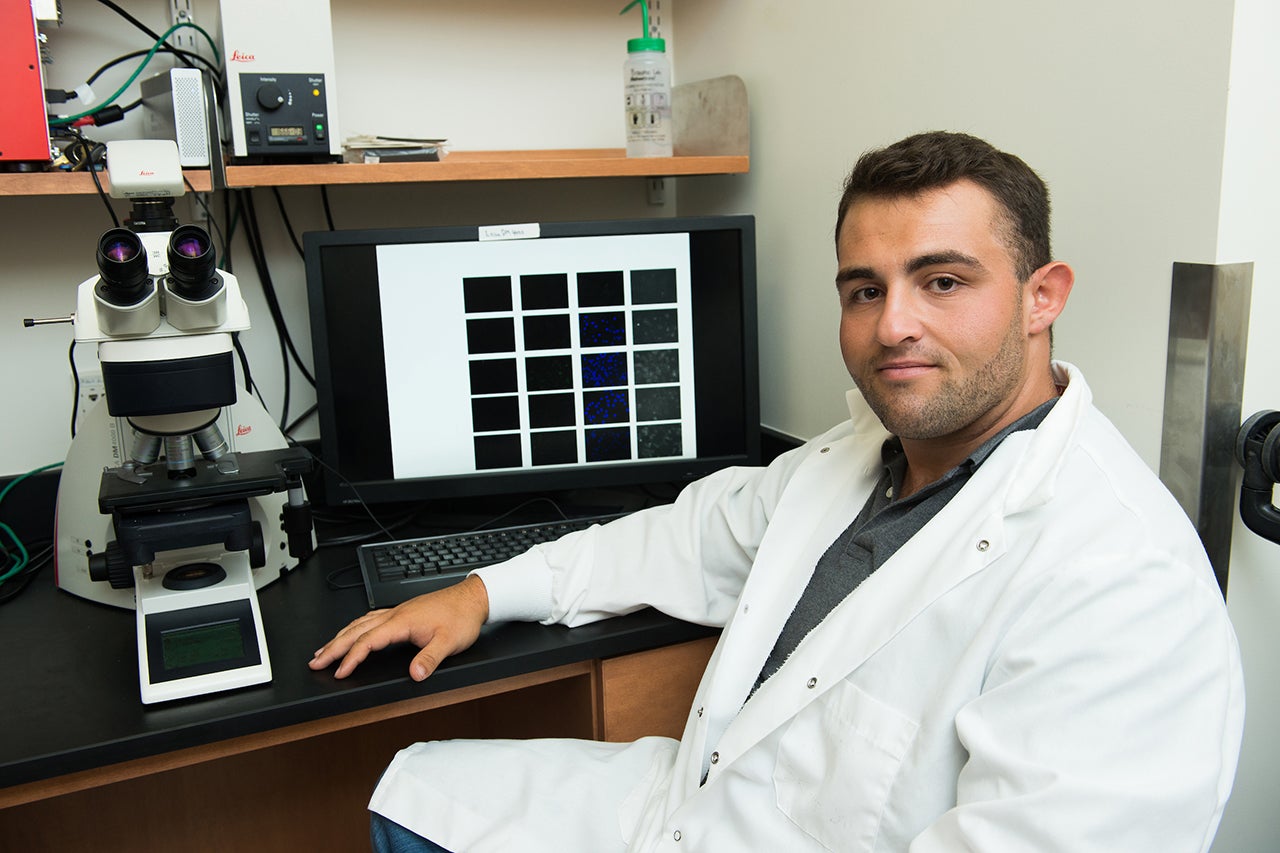Steve Frederico is happy and energized.
Standing in his white lab coat, the College of Charleston student smiles broadly. His face belies this fact, but he’s also exhausted. It’s been a long day at the Medical University of South Carolina laboratory where he is serving as a summer research fellow – and it’s not even half over yet.
A rising junior majoring in biochemistry, Frederico is living the dream. His research in MUSC’s Department of Cell and Molecular Pharmacology and Experimental Therapeutics is yielding opportunities and experience normally reserved for graduate students and post-doctoral fellows. Even better, he’s getting paid to do this. But for him, the long hours he spends in the lab or shadowing doctors in the clinic are much more valuable than a paycheck: they’re potentially extending the lives of cancer patients and serving as the perfect primer for his aspirations of becoming a neurosurgeon.
“I was here last night from 7 p.m. to 7 a.m. shadowing one of the neurosurgeons,” he says. “That was fascinating. And then I ran home to get about three hours of sleep before coming back to the lab. Now, I’m evaluating our tissue cultures, making sure that they’re growing properly.”
Those samples, growing in petri dishes in an incubator, are cells of glioblastoma, an incredibly aggressive and usually fatal form of brain cancer. The causes of a glioblastoma tumor are usually unclear, and there aren’t currently any cures; once a person is diagnosed with this form of cancer, they’re usually given a life expectancy of just 12 to 15 months.
“We know far too little about this disease,” says Frederico.
Working alongside his lab partner, a postdoctoral fellow from MUSC, Frederico is responsible for cultivating the cells, introducing a nanoparticle and then chronicling what happens to that particular particle. That research could potentially extend the lives of patients with glioblastoma.
“It’s a long, lengthy, sometimes frustrating process to gather all the data that we’re seeking,” he says. “One of our principal goals is to see if the cells recognize and engulf the nanoparticles. If they do, then that’s an encouraging indication that medicine carried in the nanoparticles could possibly be delivered in this fashion to treat a patient suffering from glioblastoma.”
Frederico’s mentor is Dr. Ann-Marie Broome, the Director of Molecular Imaging at MUSC whose work focuses on the development of nanotechnologies for applications in medicine and biotechnology.
“We have 21 different research projects going on in my lab,” she says. “Our main goal is to expand and modify currently available therapeutics to a variety of diseases, some cancerous, some not. My real passion is changing the way that we deliver drugs and therapies to inaccessible and rare diseases or changing the way we utilize therapeutics to make them more efficient and less detrimental to the patient.”
Broome explains that the research conducted in her lab is cutting-edge, on a par with the top labs in the country.
“A lot of what Steve does on the two projects that he’s involved in is proprietary and confidential,” she says. “We’re essentially creating new nanomedical platforms that will hopefully be translated into the clinic so the results are highly sensitive and exciting.”
And the results of Frederico’s work may eventually be included in a manuscript that Broome will submit for publication. If that happens, Frederico will be one of the paper’s lead authors.
“That’s very cool,” he says. “If the paper gets published, it will be an advantage for me to have that credit as a first author. But even more significant is that, for a research team, publishing along the way is an important validation of our work within the scientific community.”
As impressive as scientific publication can be, that isn’t Frederico’s chief motivation. What makes it all worthwhile for him – the long hours in the lab, the late evenings and lack of sleep – is that right across the street from his building is MUSC’s Children’s Hospital, which houses a pediatric neuro-oncology department. Frederico likes to spend time with the kids who are being treated for cancer. He is particularly fond of those with glioblastoma tumors.
“Knowing that I’m doing something in the lab that can potentially help these kids live longer, that’s really what motivates me,” he says. “You don’t need anything more than that.”
Featured image by Reese Moore.






